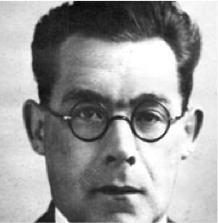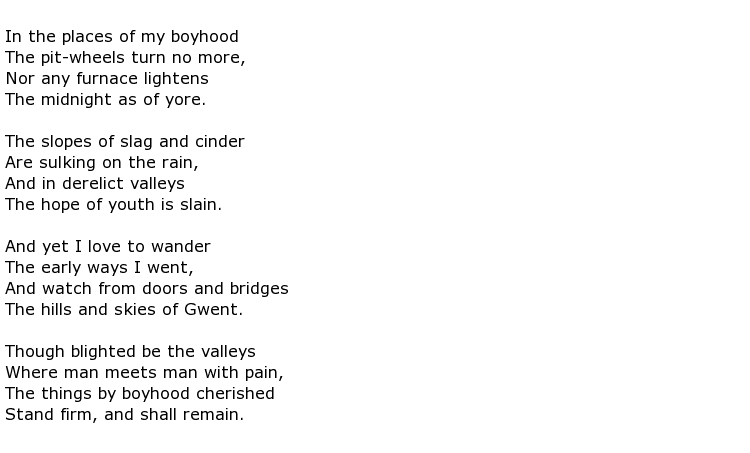 Idris Davies was a Welsh poet and teacher who originally wrote in the Welsh language but eventually switched to English. He wrote from a Socialist point of view and had struggled as a working man in the Welsh coalfields during the early 20th century, thus enabling him to write from personal, and sometimes bitter, experience. His work was much admired by another famous Welshman – Dylan Thomas.
Idris Davies was a Welsh poet and teacher who originally wrote in the Welsh language but eventually switched to English. He wrote from a Socialist point of view and had struggled as a working man in the Welsh coalfields during the early 20th century, thus enabling him to write from personal, and sometimes bitter, experience. His work was much admired by another famous Welshman – Dylan Thomas.
He was born in the small Welsh town of Rhymney, in the county of Monmouthshire, in January 1905. His father was a colliery worker so it was almost inevitable that Idris would also end up working underground. Like most boys of his age he left school early, in his case at the age of 14, to work as a coal miner close to his home. It was a harsh life and Idris lost one of his fingers in a mining accident. The General Strike of 1926 was to give him a dramatic change of direction though.
When the pit where he was working closed down he decided to get himself better educated. He had already developed an interest in literature, particularly the work of Shelley, and he worked his way through college courses at Loughborough and the University of Nottingham with a view to becoming a teacher. He was successful in this career path, and he served at a number of schools in London. It was while living in London that he came into contact with Dylan Thomas. He had already had poems published in periodicals such the “Left Review” along with a number of newspapers but his first volume of poems – Gwalia Deserta – came out in 1938. This was a bleak view of the industrial devastation suffered across Wales and he followed this up with The Angry Summer in 1943. This was, essentially, a single, epic poem about the effects of the General Strike on industrial communities in South Wales.
In 1947 he secured a teaching post in his home town of Rhymney and he remained there for the rest of his life which turned out to be only six more years. In homage to his home town he had written The Bells of Rhymney, which was written in the style of the nursery rhyme Oranges and Lemons and was part of the Gwalia Deserta work. It was a ballad, telling the story of a mining accident in the town, and was set to music and recorded by a number of famous folk singers such as Pete Seeger, Judy Collins and Dick Gaughan. It was also picked up by American folk-rockers The Byrds and Bob Dylan.
Gwalia Deserta was perhaps his most famous piece of work and an extract is included below. The title translates into English as Wasteland of Wales and tells a bleak tale of the devastation wrought on a community when their industry is taken away:

Not long before Davies died another volume of poems was published called Selected Poems and this coincided with a letter from Dylan Thomas who had recently recited the Bells of Rhymney on the radio. Thomas stated that the poem was “not angry enough”, and could not be considered to be truly representative of the work of Idris Davies.
The poet wrote the following interesting lines in his diary, explaining his philosophy on life:

Idris Davies died on the 6th April 1953, in Rhymney. Abdominal cancer struck him down at the young age of 48.

